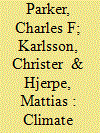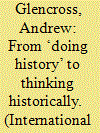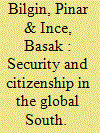|
|
|
Sort Order |
|
|
|
Items / Page
|
|
|
|
|
|
|
| Srl | Item |
| 1 |
ID:
142562


|
|
|
|
|
| Summary/Abstract |
Past research has posited that effective leadership is an essential ingredient in reaching international agreements and overcoming the collective action problems associated with responding to climate change. Despite its fundamental importance for leadership relationships, the demand side of the leadership equation has been comparatively neglected in the literature. In this study, we answer several related questions that are vital for understanding the leadership dynamics that impact the United Nations Framework Convention on Climate Change (UNFCCC) negotiations. Are there any leaders in the field of climate change and, if so, who are they? How do followers select climate leaders? What factors are important to them? Using unique survey data collected at four consecutive United Nations (UN) climate summits, Conference of Parties (COP) 14–17, this article investigates which actors are actually recognized as playing a leadership role in the UNFCCC negotiations and probes how followers select leadership candidates in this issue area. The survey findings reveal a fragmented leadership landscape, with no one clear-cut leader, and spotlight that if an actor seeks to be recognized as a leader, it is crucial to be perceived as being devoted to promoting the common good.
|
|
|
|
|
|
|
|
|
|
|
|
|
|
|
|
| 2 |
ID:
142563


|
|
|
|
|
| Summary/Abstract |
This article provides a case study in the new and developing field of inter-organisational relations by looking at the position of the European Union (EU) within the Group of Eight (G8). It analyses the questions of why inter-organisational relations start, and how they develop over time. I argue that inter-organisational relations are determined by the dynamics within the international organisations that are involved: both the characteristics that define these organisations, as well as the preferences of their constituent parts. The G8-EU relation was a by-product of European integration resulting from the transfer of competences, but was initially thwarted by the strong and divided preferences within the EU. While the G8’s informality at first facilitated this internal division, it also enabled this relation to change over the following decades. This change cannot only be ascribed to rationalist and social-institutionalist factors but also testifies to a logic of path dependence.
|
|
|
|
|
|
|
|
|
|
|
|
|
|
|
|
| 3 |
ID:
142561


|
|
|
|
|
| Summary/Abstract |
Although most attempts to foster interdisciplinary dialogue are located outside mainstream International Relations (IR), this article seeks to problematize how the two dominant paradigms of IR theory, realism and liberalism, think historically. The argument proceeds by examining how the disciplines consider what historical knowledge is useful for, that is, how they think historically or are historically conscious. This constitutes a shift away from the dominant dialogue over how to ‘do history’ in IR. Historical consciousness is defined as the understanding of the temporality of historical experience or how past, present and future are thought to be connected. The analysis is set up to explore the extent to which both disciplines share a similar historical consciousness beyond merely treating history as instructive. To do so the article first examines the canon of European historiography to identify three genres of historical consciousness: history as teacher, history as narrative, history as representation. This survey of pre-positivist historiography serves to show the complexity of historical reflection within that discipline, something against which variance within IR theory can also be compared. Disciplinary comparison reveals that three genres of historical consciousness are present in liberalism and realism: lessons of history, revenge of history, and among progressive realists a speculative escape from history genre. Whereas lessons of history spans both ‘isms’ in IR, realism is shown to have a more complex understanding of temporality, thereby providing another conceptual starting point for distinguishing between these two ‘traditions’. Moreover, these differences between genres of historical consciousness used within realism capture the split between realists that lies not in the origin of anarchy itself but in how realists think historically. What emerges, therefore, by comparing how disciplines think historically rather than ‘do’ History, is the equally purposive or even political use of the historical knowledge they produce.
|
|
|
|
|
|
|
|
|
|
|
|
|
|
|
|
| 4 |
ID:
142565


|
|
|
|
|
| Summary/Abstract |
The relationship between security and citizenship is more complex than media portrayals based on binary oppositions seem to suggest (included/excluded, security/insecurity), or mainstream approaches to International Relations (IR) and security seem to acknowledge. This is particularly the case in the post-imperial and/or postcolonial contexts of global South where the transition of people from subjecthood to citizenship is better understood as a process of in/securing. For, people were secured domestically as they became citizens with access to a regime of rights and duties. People were also secured internationally as citizens of newly independent ‘nation-states’ who were protected against interventions and/or ‘indirect rule’ by the (European) International Society, whose practices were often justified on grounds of the former’s ‘failings’ in meeting the so-called ‘standards of civilization’. Yet, people were also rendered insecure as they sought to approximate and/or resist the citizen imaginaries of the newly established ‘nation-states’. The article illustrates this argument by looking at the case of Turkey in the early Republican era (1923–1946).
|
|
|
|
|
|
|
|
|
|
|
|
|
|
|
|
| 5 |
ID:
142564


|
|
|
|
|
| Summary/Abstract |
How does diplomacy recognise the political identity of international actors? Drawing on critical approaches, this article analyses the development of identities in diplomatic communications concerning the Western Sahara conflict from the early 2000s to the present. It argues that a failure to question relationships between identities as projected in diplomatic sources and those of global threats like Islamic terrorism is a crucial driver behind the stalemate. The analysis demonstrates that Frente Popular de Liberación de Saguía el Hamra y Río de Oro (POLISARIO) and Morocco became subsumed into the binary identities of the War on Terror due to the dominance of concerns about terrorism pervading diplomatic communication. Morocco played a significant role in this identification through textual interventions that linked POLISARIO identity to concerns about terrorism, gaining significant agency in the articulation of US and French policy on the conflict. This case illustrates how representations of identity in diplomatic communication in relation to dominant policy concerns grant actors agency for policy outcomes.
|
|
|
|
|
|
|
|
|
|
|
|
|
|
|
|
|
|
|
|
|